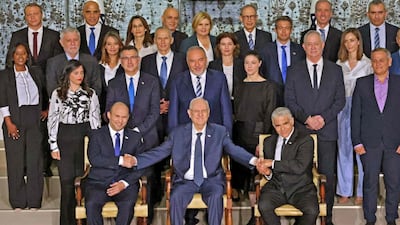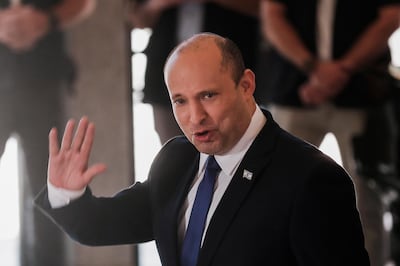In 2015, Naftali Bennett, Israel's new Prime Minister, did not mince his words when he said that the creation of a Palestinian state was tantamount to Israel committing suicide. Words such as these have planted the young tech billionaire firmly on the right wing of Israeli politics. Today, in a remarkable government that few political systems other than that of Israel could create, Mr Bennett will assume office as part of a ruling coalition that spans the country's political spectrum. It includes nine female ministers and, for the first time, an Arab party. Even by the standards of Israeli politics, where coalition building is the name of the game, a government such as this one is a challenge to maintain.
Two tasks confront the government as it enters office. The first is to prevent infighting from distracting from the desperate need for new thinking and substantive action to resolve the Palestine-Israel conflict. In the aftermath of some of the worst fighting seen in Palestine and Israel in years, the challenge is even greater.
After such a violent episode, the government will need to address with urgency issues within Israeli society, such as dispossession among Arab-Israelis and the flaring up of internal discontent. At the same time, there will be the many Jewish Israelis demanding a firm response after Hamas, the extremist militant party ruling Gaza, fired thousands of rockets into Israeli territory.
The second task will be for the government, which marks an end to Benjamin Netanyahu's 12 years in power, to survive. It secured its victory in the Knesset, Israel's parliament, by a single vote.
In recent years, the Palestinian leadership in Ramallah resisted engagement with Mr Netanyahu's government in light of his hawkish policies on settlements and annexation of Palestinian land. With a new government comes new opportunities for dialogue, but the Palestinian side will need a coherent negotiating partner and clarity on its own position for negotiations.
These issues are among the many precursors to resolving in the decades-long peace process between Palestinians and Israelis. Genuine progress will require a genuine desire for it, rather than the stultified approach of "managing" the conflict. A just settlement will combine the recognition of Palestinian rights to live in peace and Israel's right to security.
A resolution to the conflict has been so elusive precisely because there is so much at stake for either side. With the change it represents, today's coalition has an early window to define its approach to the issue and breathe life into a stalled debate. In their very formation, they managed to pull off nothing short of a political miracle. The world will be hoping that an even bigger one for Palestine is on the horizon.



